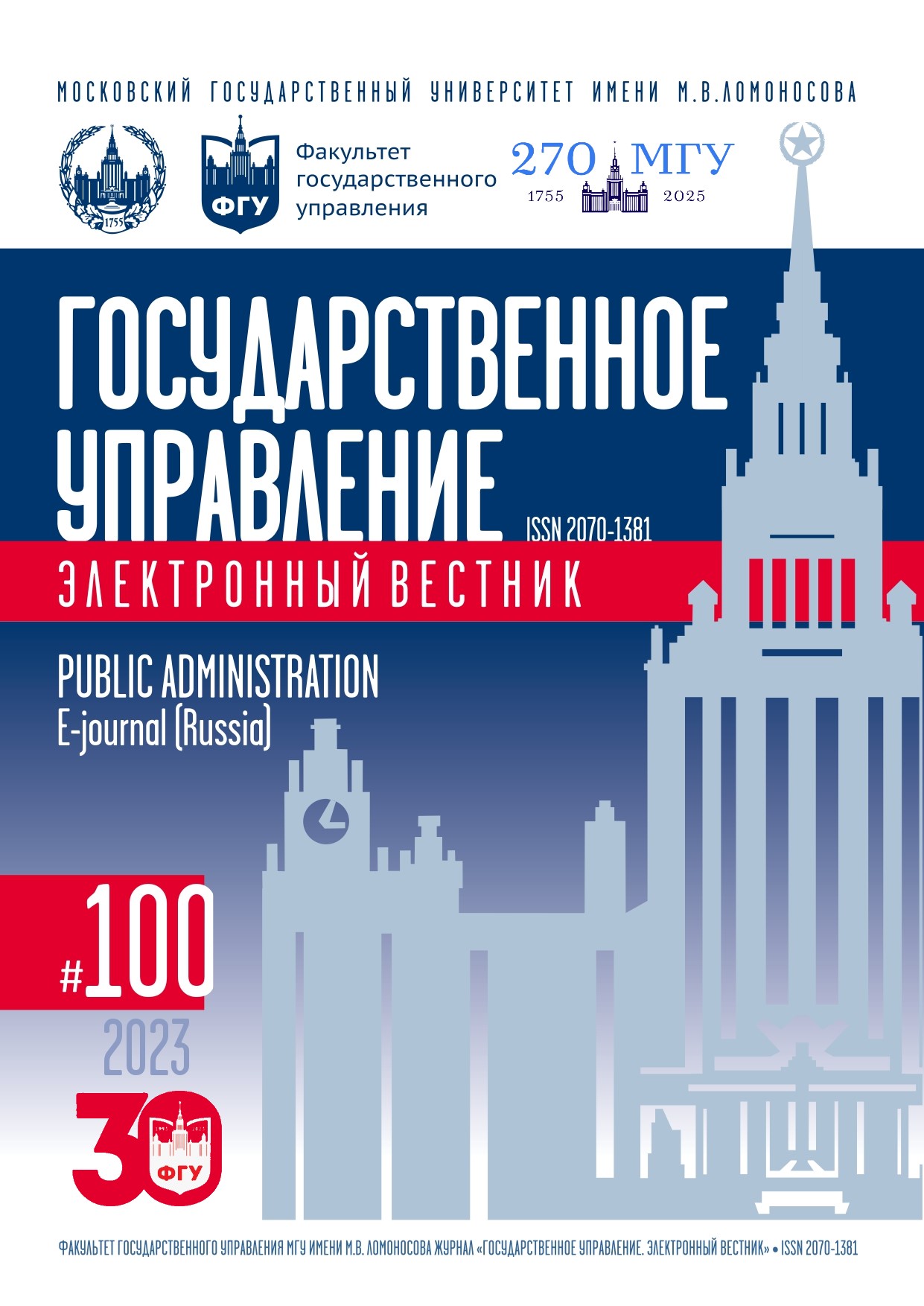State Financial Policy of Russia: Features of Development and Implementation in New Geopolitical Conditions
Keywords:
Structure of financial policy, methods and instruments of financial regulation, budget policy, financial relationships, macroeconomic instabilityAbstract
The article focuses on the issues of managing Russia’s economic and financial relations in the conditions of a multipolar world formation. The toolkit of economic management in the field of finance is presented. Domestic and foreign scientific sources are analysed in a retrospective manner. Methods of state economic and financial regulation in the dynamics of their development over the period after the global economic crisis of 2008–2009 till now have been considered. As a result, features of the ongoing state financial policy since the beginning of the 2010s and its modernization in the early 2020s are identified; the economic and financial instruments used in practice are summarized and budgetary, tax and customs-tariff innovations to stimulate economic growth and integration processes in the national economic system of the country are presented. Furthermore, the need to monitor the current situation and promptly respond to its peculiarities when choosing priority means of regulation is justified. The key role of budget planning in the functioning of the financial sector of the state has been established; the expediency of coordination by all participants of economic relations of the actions taken in the process of tactical and strategic financial management has been confirmed. The need for the timely mobilization of all available resources and the coordinated application of budgetary, tax and customs-tariff instruments in times of crisis and increased macroeconomic instability has been proven. As recommendations possible vectors for developing state financial regulation in the economic space of Russia have been determined. Conclusions about the expediency of activating the financial policy of Russia in the new geopolitical reality, a larger-scale selective use of financial regulation methods to ensure the stable functioning of the country’s national economy are made.
References
Глазьев С.Ю. Долгосрочная перспектива развития ЕАЭС // Евразийская интеграция: экономика, право, политика. 2023. Т. 17. № 2(44). С. 9–10. DOI: 10.22394/2073-2929-2023-02-9-10
Иванова Н.Г. Финансовая политика: вопросы методологии и современной российской практики // Вестник финансового университета. 2014. № 1(79). С. 64–73.
Косов М.Е., Чалова А.Ю., Ахмадеев Р.Г., Голубцова Е.В. Федеральный бюджет и бюджетно-налоговая политика государства: макроэкономическая адаптация до 2025 года // Финансовый журнал. 2023. Т. 15. № 2. С. 8–26. DOI: 10.31107/2075-1990-2023-2-8-26
Масгрейв Р.А. Государственные финансы: теория и практика. Москва: Бизнес Атлас, 2009.
Молчанов И.Н., Молчанова Н.П. Государственное финансовое регулирование в период усиления глобальной нестабильности // Государственное управление. Электронный вестник. 2021. № 85. С. 84–103. DOI: 10.24412/2070-1381-2021-85-84-103
Молчанова Н.П. Концепция построения финансовой политики в трудах отечественных исследователей и ее практическая реализация // Экономика. Налоги. Право. 2018. Т. 11. № 1. С. 50–58. DOI: 10.26794/1999-849X-2018-11-1-50-58
Омурканов Ы.К. Возможности государственного регулирования условий инвестиционного климата // Экономическое переустройство Казахстана в условиях мирового геополитического кризиса: материалы международной научно-практической конференции, посвященной 70-летию Института экономии КН МНВО РК. Алматы: Институт экономики КН МНВО РК, 2022. Т. 1. С. 195–199.
Сабитова Н.М. Государственная финансовая политика: проблема целей // Дайджест-финансы. 2010. № 10(190). С. 9–13.
Силуанов А.Г. Задачи финансовой политики Российской Федерации на среднесрочную перспективу // Вестник Финансового университета. 2017. Т. 21. № 3(99). С. 50–56.
Marques P. New Industrial Policy and the Role of Executive Agencies at the Subnational Level // INGENIO Working Paper Series. 2020. № 2020–02. DOI: 10.13140/RG.2.2.14752.20483
Moreira T.B.S., Mendonça M.J., Sachsida A. Fiscal and Monetary Policy Rules in Brazil: Empirical Evidence of Monetary and Fiscal Dominance // CEPAL Review. 2021. № 135. P. 81–104.
Wildman J.L., Nguyen D.M., Duong N.S., Warren C. Student Teamwork during COVID-19: Challenges, Changes, and Consequences // Small Group Research. 2021. Vol. 52. Is. 2. P. 119–134.
Downloads
Published
Most read articles by the same author(s)
- Igor N. Molchanov, Natalia P. Molchanova, Reproduction of Human Potential in Changing Conditions of Higher Education , Public Administration. E-journal (Russia): No. 92 (2022)
Similar Articles
- Igor N. Molchanov, Natalia P. Molchanova , Government Financial Regulation in a Period of Increasing Global Instability , Public Administration. E-journal (Russia): No. 85 (2021)
- Varvara Yu. Kulkova, Yulay R. Minnullin, Haitham Abbas Mohamed Youssef, Social Determinants of Partnership Financing in Regional Practices(Case Study of the Republic of Tatarstan) , Public Administration. E-journal (Russia): No. 98 (2023)
- Valeriya E. Gavrilova, Population Health as a Nationally Significant Resource in the Context of Expensive Money , Public Administration. E-journal (Russia): No. 111 (2025)
- Liubov N. Orlova, Polina S. Bondareva, New Venture Instruments for Financing Start-Ups at Early Stages of Development on Modern Russian Venture Market , Public Administration. E-journal (Russia): No. 89 (2021)
- Georgy A. Borshchevskiy, Effectiveness of the Russian Far East Regulation Tools , Public Administration. E-journal (Russia): No. 100 (2023)
- Timur O. Tarba, Instruments of Interaction between State Corporations and Subjects of the Russian Federation , Public Administration. E-journal (Russia): No. 109 (2025)
- Daria V. Evtyanova, Concept and Principles of Economy State Regulation for Overcoming Economic Crisis in Russian Federation , Public Administration. E-journal (Russia): No. 92 (2022)
- Matvey S. Oborin, Mechanisms for Stimulating Innovative Development of Single-Industry Towns in Arctic Territories , Public Administration. E-journal (Russia): No. 91 (2022)
- Roman A. Vakhrameev, Assessing Factor Influence on Interbudgetary Transfers Income to Municipal Budgets , Public Administration. E-journal (Russia): No. 104 (2024)
- Elena E. Shestakova, Social Policy for Human Development: World Experience , Public Administration. E-journal (Russia): No. 85 (2021)
You may also start an advanced similarity search for this article.




